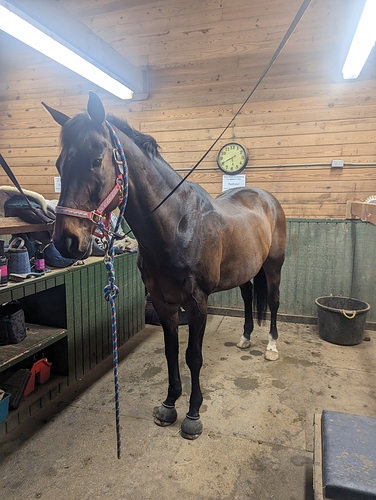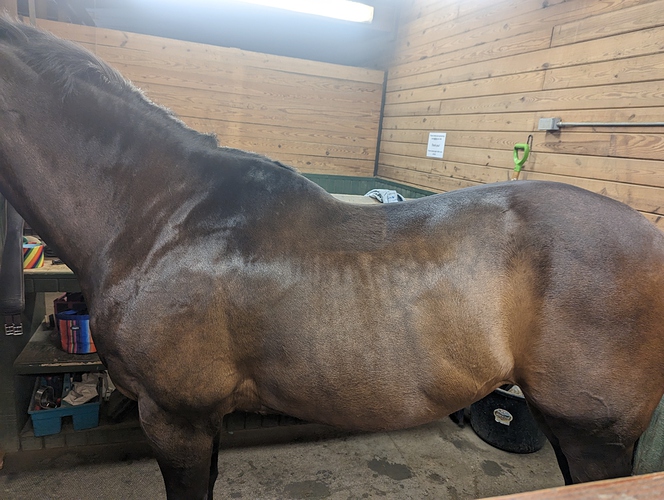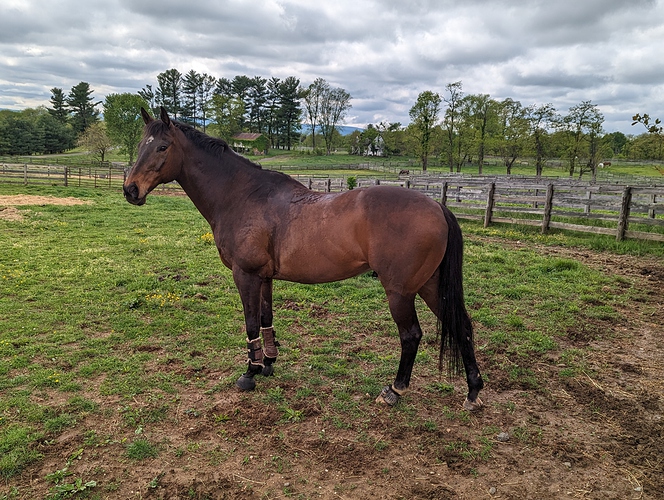Hi all,
Hoping I can get some suggestions on what I can do differently with managing some of my boy’s issues.
19 yo OTTB gelding, formerly evented, mostly play in baby local jumpers now
Current diet:
8 lbs Purina Impact Performance Pro (split into 2 feedings)
4 lbs soaked alfalfa pellets at lunch
1 cup Supersport
1 cup Omega Horseshine
1 scoop Elevate vitamin E
16 Zyrtec pills split in two feedings
His paddock is weedy and somewhat sparse but he gets plenty of hay and is in great weight and coat condition. He’s on private turnout and usually goes out at night, in during the day, unless weather is bad.
The current management issues:
-
He is arthritic and gets regular hock and stifle injections (every 9-12 months). However, usually my first sign for him needing hocks is sticky lead changes. He is not currently having trouble with lead changes. He is reaching the 9 month mark for hocks. His back has been feeling tight under saddle and he feels unable to lift at the canter. He is generally feeling very back sore and tight. He also appears to be more sore in his right hock than his left (vet agreed).
-
He used to get really bad headshaking symptoms in the spring, but this has not happened the last 8-10 years. This year his headshaking has suddenly been very bad, leading to a lot of tension and tightness throughout his neck and back. We increased the Zyrtec dosage and it seemed to mitigate somewhat but not eliminate. His allergies are clearly bothering him and he is having trouble breathing well when exercising. He has also started tail rubbing and has some insect bite reaction issues.
-
He’s started kicking his stall in the middle of the night when in. This has resulted in multiple large repairs to the stall and him being banned from having anyone next to him. We cannot figure out when or why he is doing it, and I am worried I will get asked to leave.
-
He appears to have lost topline despite the extra protein in his diet and plenty of correct flatwork and hill work that should help maintain it.
Things we’ve done or are doing:
- Increased Zyrtec dose
- Vet exam and scheduled hock injections
- Tested for Lyme - he was normal except on the one that indicated chronic Lyme, which was slightly elevated (vet said it was in the gray area). He starts a 2 week course of doxy this week
- Ran CBC and insulin test, all normal
- Had saddle checked (she recommended adding a shim to my Mattes pad but otherwise it was still a good fit)
- Given time off (still really tight after a week off)
- 10 day course of Robaxin. This helped a lot but after finishing it he is just as tight.
- Scheduled chiro and acupuncture
The vet has recommended that we move to back x-rays if the doxy plus hock injections don’t help. I’m concerned that the headshaking is causing a lot of the tightness, but not sure how to help the headshaking.
I’m wondering if anyone has other ideas. Was thinking of trying feeding spirulina to help with the allergies but worried Mr. Picky won’t touch it.
I’ve attached some pictures of the trouble makermaker.



